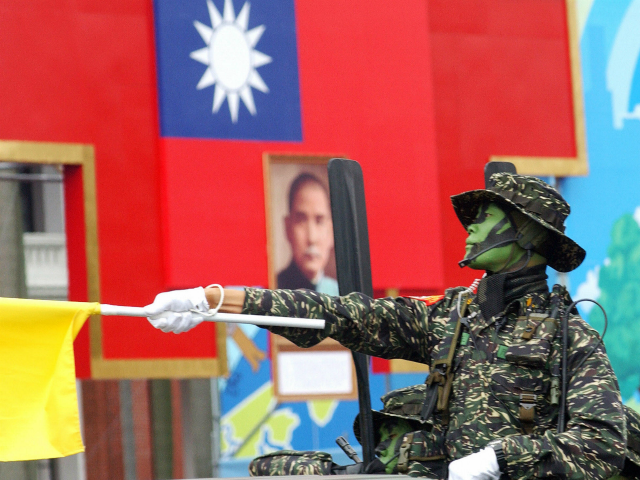General Li Zuocheng of China’s People’s Liberation Army (PLA) echoed the sentiments of Communist Party leader Xi Jinping in remarks Tuesday urging America not to retain ties to Taiwan and that any attempt to protect it from Chinese invasion would be met with military force.
“If anyone wants to separate Taiwan from China, the Chinese military will safeguard the national unity at all costs so as to protect China’s sovereignty and territorial integrity,” Li, the PLA’s chief of the Joint Staff Department, reportedly said following a meeting with U.S. Admiral John Richardson, the U.S. chief of naval operations, who is in Beijing for in-person talks with Chinese military leaders.
Chinese state media reported that Li “stressed that no external interference would be allowed in China’s internal affairs, concerning China’s core interests and the national bond of the Chinese people.” Despite the tense language, the government claims that the discussion was productive and that Li claimed “that the common interests between the two countries are much more than contradictions and disputes, thus cooperation is the best choice for both sides.”
The South China Morning Post, which carried the menacing quote about Taiwan, also noted that Li emphasized cooperation outside of the context of Taiwan.
“The two militaries should respect each other, strengthen mutual trust and communication, properly manage risks, and work to make military exchanges a stabilizer of the Sino-US relationship,” the Post quotes Li as saying.
Richardson has meetings scheduled in Beijing and Nanjing with military officials this week during his three-day visit, following closely after Xi Jinping announced in a new year speech that his regime would no longer tolerate Taiwan’s sovereignty.
“Reunification is a historical trend and it is the right path. Taiwan independence is an adverse current of history and is a dead end,” Xi said in a speech at the beginning of the month. “We make no promise to abandon the use of force.”
China does not consider Taiwan, officially the Republic of China, a sovereign state, but rather a rogue province attempting to illegally implement republican democracy. Xi suggested the imposition of the “one country, two systems,” policy present in Hong Kong on Taiwan during his speech. China has abused of the policy over the past two years to manipulate local elections and crack down on pro-democracy protests in violation of Beijing’s promise to respect Hong Kong’s freedom.
In response to Xi, Taiwanese President Tsai Ing-wen delivered a speech in which she adamantly rejected “one country, two systems” and urged China to abandon communism.
“Democratic values are the values and way of life that Taiwanese cherish, and we call upon China to bravely move towards democracy,” she said. “This is the only way they can truly understand Taiwanese people’s ideas and commitments.”
China must “face the reality of the existence of the Republic of China (Taiwan), and not deny the democratic system that the people of Taiwan have established together,” she concluded.
China has not responded directly to the speech. Instead, it has continued to pressure Taiwan and its allies to allow China to overrun the island. In remarks to the press on Monday, Chinese Foreign Ministry spokeswoman Hua Chunying warned the United States and other allied countries to avoid doing business with Taiwan by selling military equipment.
“China firmly opposes arms sales to Taiwan by any country and military links in any form between any country and Taiwan,” Hua said. “We urge the U.S. and other relevant countries to keep in mind the sensitivity and graveness of this issue, earnestly abide by the one-China principle … stop having any military links with Taiwan, and prudently and properly handle Taiwan-related issues.”
Richardson’s also followed several U.S. naval Freedom of Navigation Exercises (FONOPs) in the South China Sea designed to keep China from illegally colonizing international waters.
In a statement Monday, the U.S. Navy said that Richardson’s visit was aimed in part at “addressing risk reduction and adherence to rules of behavior.” Richardson met with the head of China’s navy, Vice Adm. Shen Jinlong, on Monday.
“There is no substitute for these types of face-to-face meetings. Given the responsibilities that our navies have in the larger nation-to-nation relationship, we must work together. These meetings between senior leaders allow us to speak candidly about areas where we agree and about how to manage risk while we resolve our differences,” Richardson reportedly said following his meeting with Shen.

COMMENTS
Please let us know if you're having issues with commenting.